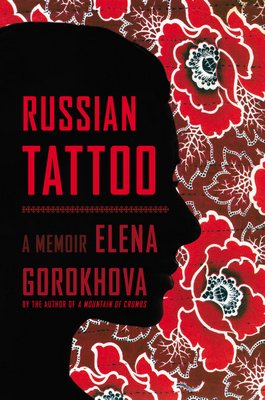
Elena Gorokhova’s memoir “Russian Tattoo” (Simon & Schuster, 317 pp, $26) is the sequel to “A Mountain of Crumbs,” which has rightly been called by Billy Collins, “a Russian ‘Angela’s Ashes.’” It was, in fact, during a memoir class she took with the late Frank McCourt that she learned how to put her complex of memories into a cohesive narrative that is at once funny and deeply touching.
“Russian Tattoo” takes up where “A Mountain of Crumbs” left off: Ms. Gorokhova, a child of Leningrad, has married Robert, an American student studying in Russia, and is thus able to escape the crippling restrictions of the Soviet government and society—and the cheerless circumstances of her life. At the center of that life is her mother, who is in many ways a heroic figure, fiercely protective of her daughter, but also a domineering one.
As it turns out, Robert’s proposal is for a marriage of convenience, a generous gesture, but not a romantic one. After all, there were only two ways someone could move from the Soviet Union: be Jewish, or marry a foreigner. Robert is thrilled with the idea of marrying, and thus saving, an exotic Russian woman. But his generosity has its limits. He tells her that theirs was to be an “open” marriage, though perhaps it was less clear to her than it was to him. She nevertheless seizes the opportunity, which she never thought she would have, to move to the United States.
She is little prepared for the brave new world she finds when she arrives. The basic things we take for granted are overwhelmingly difficult for her to assimilate. Robert brings her to lunch at a museum cafeteria and orders a hamburger for her. She doesn’t know what it is and doesn’t know how to eat it.
The incredibly obtuse Robert, whom by now we would like to bludgeon with a blunt instrument, doesn’t explain or offer assistance in negotiating the complexities of American life. He tells her that she should go out and get a job, though she doesn’t know how, does not understand what a classified ad is, and doesn’t even know how to hail a bus.
Everyday decisions used to be made for her in Leningrad, where she didn’t have the luxury of choice. Her new mother-in-law takes her to a shoe store. “Alarmingly, it is full of shoes,” she writes. She is almost helpless to choose.
Ms. Gorokhova soon realizes her husband sees her as more of a source of annoyance than as a partner. He sends her from their apartment in Texas to stay with his mother in New Jersey. There, she meets Andy, who offers her the love, support and encouragement she has been lacking. In time, she falls in love with him and she divorces Robert. They have a little girl, Sasha, and Ms. Gorokhova’s mother comes to the United States to meet her newborn grandchild—and to help her daughter, a working mother.
Unfortunately, she comes for a visit and stays for 17 years.
In a sense, she brings Leningrad with her, and Ms. Gorokhova struggles to maintain the equilibrium she has established in her new home. “Her incessant advice about everything I do propels me back in time,” she writes. “I feel like a child again, stuck in our Leningrad kitchen, the place I thought I had escaped.”
As Sasha grows up, Ms. Gorokhova attempts to raise her as a bilingual, bi-cultural child. She wants her to read Chekhov and Tolstoy, and love them as she does. But Sasha is a strong-willed, rebellious child and ultimately rejects her “Russian-ness.” The conflicts between the three generations are colorfully limned. One can imagine a home with a resident babushka and chairwoman of a “domestic politburo,” who speaks no English, a son-in-law who speaks no Russian, a teenager who wants to live like a normal American kid, and a wife, daughter and mother who tries to be a buffer between them all.
“I think of mothers and daughters stacked up inside one another and of the three of us living under one roof, like … matryoshka dolls,” she writes.
Ms. Gorokhova cannot shuffle off her Russian past. “Like a spy, I live with two identities, American and Russian—two selves perpetually crossing swords over the split inside me. My American self is freshly cheerful and shiny as a newly minted coin. My Russian self is stale and dark, a week-old brick of sour Leningrad bread. It broods and ponders, as it always has, about questions that have no clear answers.”
The ambiguous title becomes clear at the end of the narrative, when a multi-generational reconciliation takes place. I will leave it to the reader to discover its meaning.
Ms. Gorokhova writes with the facility of a native-born English speaker. She loves the English language and she uses it with grace and a Chekhovian understatement. “Russian Tattoo” renders a particularly difficult and fascinating immigrant experience. One comes away from it admiring her narrative skill, her honesty and her courage.
Elena Gorokhova, who teaches at the Stony Brook Southampton Writers Conference, will discuss her new book, “Russian Tattoo,” on Wednesday, July 15, at noon at the Rogers Memorial Library in Southampton. For more information, call (631) 283-0774, or visit myrml.org.